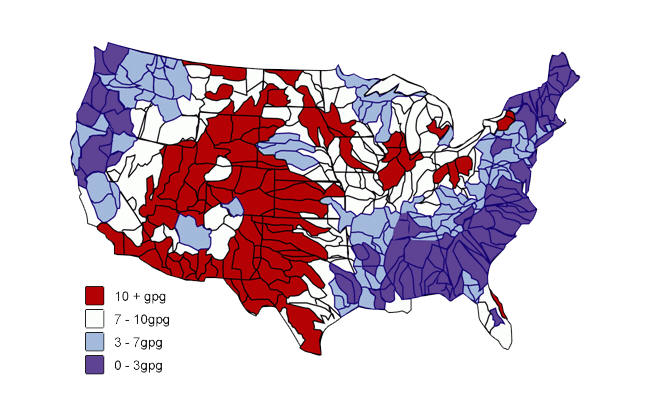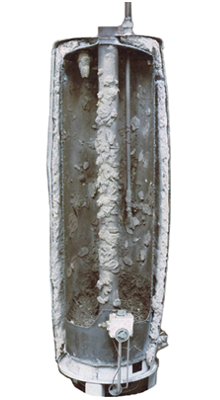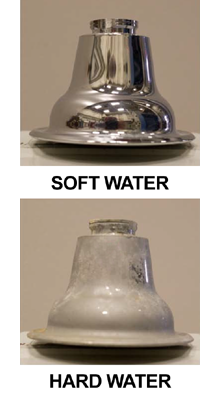Hard Water Problems in Minnesota

What is Hard Water?
The U.S. Geological Survey Office estimates that 85% of homes in the US have problems with hard water.
Hard Water is defined by the level of calcium and magnesium ions that are leached from aquifers that contain rock such as calcite, gypsum, and dolomite.
Average water hardness in the United States is 5gpg, or “grains per gallon”. In the Twin Cities, most city water and private well water is 4-5x harder with some levels reaching up to 35gpg!

Hard Water and Water Heater Damage
Studies have found that hard water deposits inside water heaters not only increases energy consumption, but also significantly decreases the lifespan as well.
In 2010 the Battelle Memorial Institute conducted an extensive study comparing water heater performance with hard water vs. soft water.
The study found that each 5gpg of water hardness resulted in 0.4 pounds of scale accumulation per year. This relatively small buildup resulted in an 8% loss in efficiency and an 8% increase in energy consumption by water heaters.
Over a 15-year lifetime, hard water was found to increase heating cost by 48% due to loss of efficiency.
At the same time, water heaters operated on softened water maintained their original factory efficiency rating.
The study also found that Tankless Water Heaters completely stopped working after 1.6 years of use due to scale plugging caused by 26gpg hard water.
Hard Water Spots, Scum, and Scale Increase Cleaning Costs
The independent testing firm Scientific Services S/D of New York recently completed two studies that compared energy requirements and detergent requirements with hard water vs. soft water.
Laundry Detergent
With soft water, the same or better stain removal and whiter clothes can be achieved by using 50% less laundry detergent. Energy can also be saved by washing in 60 degree F cold water instead of 100 degree F hot water.
Dishwasher Detergent
Dishwasher detergent can be reduced by more than 50% after softening and still get the same cleaning results.

Hard Water Damage to Appliances, Showerheads, and Faucets
Dissolved minerals begin to accumulate as they flow through plumbing fixtures and appliances. Hard water scale and hard water deposits begin to plug up or clog the flow of water.
Hard Water and Dishwashers
A study using Kitchenaid Dishwashers and Cascade Detergent ran 8 cycles a day, for 30 days. At the end of the study, the dishwashers using hard water were beginning to clog up with hard water deposits and required chemical de-scaling. In a similar study by the American Water Works Association, it was found that hard water increased appliance repairs by 50%.
Hard Water and Showerheads
Low flow, water-saving showerheads were also found to be particularly susceptible to clogging with hard water. After 18 months of simulated use, over 75% of the spray nozzles were plugged on the Moen showerheads using hard water.
What are the Best Water Treatment Systems for Hard Water?
There are numerous technologies sold online for hard water treatment.
Water Hardness levels must be reduced to less than 1gpg of hardness to achieve “soft water”.
At this point in time, there are only 2 technologies that can achieve a measurable reduction in water hardness:
Ion Exchange Water Softeners
Water Softeners use small plastic beads called “ion exchange resin” to remove hardness. These beads are coated with sodium, and have a charge that causes hard minerals to stick to them. As hard water sticks to these beads, the sodium is released into the water. Hence the term “ion exchange”. You are exchanging or trading a “hard mineral” for a “soft mineral”.
Membrane Softening
The HERO System is a unique product in the industry that uses a membrane to soften water. The HERO membrane forces water through small pores roughly 1000x smaller than a human hair. During this process, hard water along with other contaminants like Arsenic, Fluoride, and Chromium are physically removed from the water. You can achieve clean, chemical-free water with less than 1 grain of hardness – without adding salt to the water.
